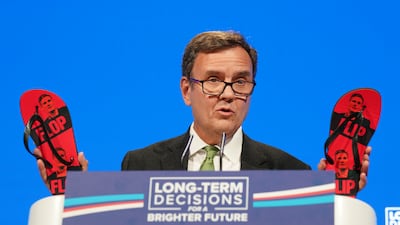Keir Starmer will have his last chance to introduce himself to the British public as Labour gathers for its annual conference in Liverpool on Sunday, with the Conservative government confident it can exploit uncertainty over his plans for victory.
Activists came out of the Conservative conference in Manchester this week buoyed by the belief that Mr Starmer is failing to show how he would change the UK.
“The point here is [Prime Minister] Rishi Sunak has come out and told us what he’s going to do and if Starmer won’t tell us what he wants to do, then I think we’ve got a good chance of winning the next general election,” said Gully Lowick, who attended the conference.
Conservative strategists have hit on the idea that they can appeal to the 10-second voter, introducing tangible policies that can shift the polls by appealing to those with short attention spans.
As a result of this tactic, Mr Sunak has portrayed himself as a candidate of change who can change the course of 13 years of party rule. He has torn up the country’s net-zero programme, scrapped a costly HS2 rail building programme and shaken up the country’s blue riband school exam A levels.

The Prime Minister accuses his rival of chasing power for the sake of power and says his approach is “everything that is wrong with our politics”.
“The worst thing about Sir Keir is that he just says whatever he thinks will benefit him most,” Mr Sunak told the Conservative conference.
“It doesn’t matter whether he can deliver it, doesn’t matter if it’s true, it doesn’t matter if he said the opposite a few months ago. He is the walking definition of the 30-year political status quo I am here to end.”
As Mr Sunak approaches his first anniversary in Downing St at the end of the month, he knows he must call an election before the end of 2024. Labour faces an enormous challenge in overturning the Conservative majority, which stood at 80 seats at the time of the last election.
“You’ve got slippery Starmer who changes his mind from one moment to the next and a prime minister who delivers on his promises,” Ben Houchen, the Conservative mayor of Tees Valley, declared after the conference.
In a sign of the trouble HS2 could cause Mr Starmer, the Labour leader said on Thursday he would not simply bring it back.
“I can't stand here and commit to reversing that decision – they've taken a wrecking ball to it,” he said.
For those at the Conservative conference, it was the personality and interests of Mr Sunak – he is obsessed with maths, IT and life sciences – that offered new arguments to stick with the party for a fifth term.
“I think he's a pretty talented guy and I really hope he's just himself when the campaign starts,” said one Manchester loyalist. “I think it's quite refreshing to have someone step in with a long-term vision and is someone who is almost like a sort of general manager for the country at a time of trouble.
“This is not necessarily the most flamboyant or the most charismatic type of character but people have a solid sense of the long-term decision making that he represents.”
Mr Starmer, meanwhile, a former prosecutor, has been cautious with Labour policies, leading many to say that voters cannot identify what he stands for in specific areas.
One Conservative northern activist from a seat that was part of the so-called Red Wall that Labour is seeking to regain said that this line of attack gives her something to work with on the streets.
“Knock on the door and 80 per cent of the people are undecided and we go to them and say the British people can decide for themselves,” she said.
Mr Sunak reeled off a list of places in the north that would get new rail lines, road links and other transport network that appear to be giving the activists something to boast about in these areas next year.

Privately one member of the transport lobby at the conference pointed to the north’s infrastructure gap and said Mr Sunak's moves would kick-start new projects with a more immediate impact.
“We have to go back to the drawing board and say, we're not going to do HS2, so where do we go from here in the north?” he asked.
“Who is going to be getting what and what has to be withdrawn? And we’ll be making these changes in the run-up to an election.”
Pollsters looking at the national picture doubt the possibility of a turnaround in the party’s position. A Savanta poll this week showed a 19-point gap (46 per cent to 27 per cent) between Labour and Conservative support.
A full 84 per cent of Ipsos respondents last month said they wanted new leadership. The main issues for voters are state healthcare waiting lists and the rising cost of living.
“Immigration, tax cuts and net zero are all distraction issues,” said John Curtice, professor of politics at the University of Strathclyde.
“It may be helpful, but it won't be sufficient” to help them win the next election.


